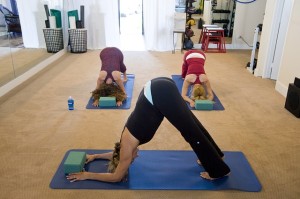- Calls to this hotline are currently being directed to Within Health or Eating Disorder Solutions
- Representatives are standing by 24/7 to help answer your questions
- All calls are confidential and HIPAA compliant
- There is no obligation or cost to call
- Eating Disorder Hope does not receive any commissions or fees dependent upon which provider you select
- Additional treatment providers are located on our directory or samhsa.gov
Lessons on How To Eat From the (Yoga) Mat
Contributor: Dr. Stephanie May, Co- Founder of The BE Program
Slow Down and Get Present to the Moment

When you walk in, your world is invited to immediately slow down. There is an invitation to be quiet and tranquil, and this is purposeful so that you can get present to the moment at hand.
A Little Setup, a Lot of Effect
Yes, there is some setting up to do; most likely, you may need to sign-in, prepare your mat, and find a comfortable position to begin your practice. But once settled, this is usually a good time to scan your body, and check in with what it is you need most.
The Lesson – It makes sense to slow down and then shift your surroundings when it is time to eat. Create an atmosphere that invites you to be present in your body. Even use meal prep time to settle more and more into your body, consistently scanning your body for signals of what it needs.
Examples of signals you may be looking for include:
- Whether you are truly hungry
- How hungry you are
- What the hunger feels like
- Where it resides
- What you may want to eat
Set An Intention
Once settled on your mat, yoga practice often begins by setting an intention for your time there. This intention serves as a reminder to help you create what it is you want most from the experience.
You may set the intention, for example, to create freedom in your body by breathing deeply and consistently. As different feelings or distractions come up as you go forward, the reminder of the intention can help bring you back to creating what you set out to.
Think- twisty pose- and then take a big deep breath…and Ahhhh!!!!
Learning Again Takes Time

Also, and especially when recovering from an eating disorder, your thoughts and feelings may be saying one thing about the food, but a clear intention can help to keep you on track to meet your highest goals for eating.
If you are in the beginning stages of your recovery, it can be particularly helpful to use your clinical team or Nutritionist to help you define these intentions so you can be sure they are beneficial to you. As you start connecting and settling deeper and deeper into your body again, your own healthy intentions will emerge.
Respect Your Body
Repeatedly within a yoga practice, the instructor will remind you to BE IN YOUR BODY NOW. What this essentially means is to connect deeply to your body’s needs and abilities in that particular moment.
You may be encouraged to challenge yourself, but not distress yourself. You are often invited to notice where you are holding tension in your body and to then breathe into that tension and see if you can create more space, peace, or freedom there.
Mindful Practice

And yet, truly respecting your body so it can be vibrant is about giving it what it needs NOW in this moment without judgment. While you are eating, this is a good time to check in with whether you are still hungry, how hungry you are now, and what else you may want to eat, if anything.
Also, if you are feeling challenged by your meal, try pausing and breathing into your body and seeing if that creates space for you to fulfill on your intention.
End With Gratitude
In the beginning and at the end of a yoga class, you will be invited to bring your hands together and to your heart. It is the final moment of the experience to honor what you have done, and what you have created within yourself.
It is a way to “seal” your practice so you can take all of the rich lessons with you that you have received by being present and a good observer of your body. If the word “Namaste” is recited, this is meant to translate to “Honor the Divine Light Within” you and those around you.
Ending your practice with gratitude helps you to look for the good in who you are and what you do; something so essential to you learning to love yourself and your body.
A Tremendous Feat – You’re Worth It
The Lesson- Healing from an eating disorder is a tremendous feat that requires great courage, strength, compassion, and understanding. Whenever you sit down to forward yourself with your food, you have done something amazing for yourself.
Old eating disorder thoughts would find ways to sabotage your eating, but new healthy thoughts use gratitude to appreciate when you nourish yourself and honor your hunger and fullness.
Join The BE Program and practice these lessons and more…
About the BE Program
The BE Program is revolutionizing the way people are healing from their food and body struggles. Not only will you have the opportunity to learn how to eat mindfully again, and practice this weekly, but you will be taken on an enlightening journey to better understand what you are REALLY needing and desiring in your life.
Our mission is to “Transform Food and Body Struggles, As An Access To Creating An Extraordinary Life.” For 8 weeks, you will receive intensive guidance and support from a global community and a team of experts.
Community Discussion – Share your thoughts here!
How has yoga helped you to relax, respect your body and find healing during your recovery?
The opinions and views of our guest contributors are shared to provide a broad perspective of eating disorders. These are not necessarily the views of Eating Disorder Hope, but an effort to offer discussion of various issues by different concerned individuals.
Last Updated & Reviewed By: Jacquelyn Ekern, MS, LPC on January 24th, 2015
Published on EatingDisorderHope.com
